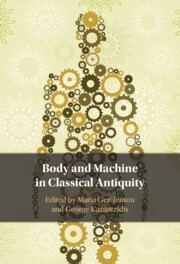Book contents
- Body and Machine in Classical Antiquity
- Body and Machine in Classical Antiquity
- Copyright page
- Contents
- Figures
- Contributors
- An Introduction to Body–Machine Intersections
- Part I Blended Bodies
- Part II The Technological Body
- Part III Towards the Mechanization of the Human Body
- Chapter 7 Aristotle on the Lung and the Bellows–Lungs Analogy
- Chapter 8 The Ill Effect of South Winds on the Joints in the Human Body
- Chapter 9 The Beauty That Lies Within
- Chapter 10 The Mechanics of the Heart in Antiquity
- Chapter 11 The Mechanics of Galen’s Theory of Nutrition
- Chapter 12 Iatromechanism and Antiquarianism in Morgagni’s Studies on Celsus, 1720–1761
- Conclusions or From Antiquity to the Early Modern
- Index of Passages
- General Index
- References
Chapter 8 - The Ill Effect of South Winds on the Joints in the Human Body
Theophrastus, De ventis 56 and Pseudo-Aristotle, Problemata 1.24
from Part III - Towards the Mechanization of the Human Body
Published online by Cambridge University Press: 13 July 2023
- Body and Machine in Classical Antiquity
- Body and Machine in Classical Antiquity
- Copyright page
- Contents
- Figures
- Contributors
- An Introduction to Body–Machine Intersections
- Part I Blended Bodies
- Part II The Technological Body
- Part III Towards the Mechanization of the Human Body
- Chapter 7 Aristotle on the Lung and the Bellows–Lungs Analogy
- Chapter 8 The Ill Effect of South Winds on the Joints in the Human Body
- Chapter 9 The Beauty That Lies Within
- Chapter 10 The Mechanics of the Heart in Antiquity
- Chapter 11 The Mechanics of Galen’s Theory of Nutrition
- Chapter 12 Iatromechanism and Antiquarianism in Morgagni’s Studies on Celsus, 1720–1761
- Conclusions or From Antiquity to the Early Modern
- Index of Passages
- General Index
- References
Summary
The aim of this chapter is to demonstrate that Theophrastus, in De ventis 56, employs material principles to explain certain features of both living beings and inanimate things, and that the unknown author of Problemata physica 1.24, having been influenced by Theophrastus, uses these same principles but in a different way, treating the parts of certain artifacts as models of, or analogous to, parts of the human body. Special attention is given to both Theophrastus’ discussion of Notos, the south wind, and to De ventis 56–58, in which he deals explicitly with the effects of winds on the human condition. (A revised version of Mayhew’s edition of the text of De ventis 56, with a detailed apparatus criticus, is included in an appendix.)
- Type
- Chapter
- Information
- Body and Machine in Classical Antiquity , pp. 203 - 217Publisher: Cambridge University PressPrint publication year: 2023



